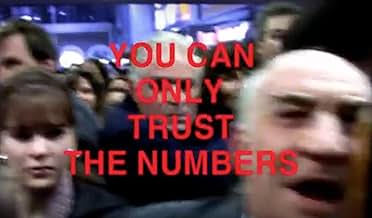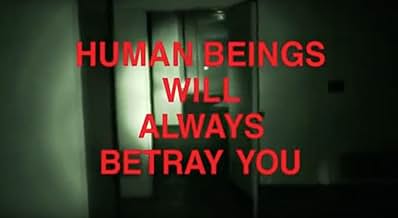The Trap: What Happened to Our Dream of Freedom
- Miniserie de TV
- 2007
- 1h
Agrega una trama en tu idiomaThe many ways in which Western notions of personal and political freedom are changing in the 21st Century are explored in this three-part documentary from writer and filmmaker Adam Curtis.The many ways in which Western notions of personal and political freedom are changing in the 21st Century are explored in this three-part documentary from writer and filmmaker Adam Curtis.The many ways in which Western notions of personal and political freedom are changing in the 21st Century are explored in this three-part documentary from writer and filmmaker Adam Curtis.
Fotos
Argumento
¿Sabías que…?
- Citas
Voice Over: When the managers were set a target to reduce the waiting time in Casualty, they came up with more clever strategies. A new job was invented, called the Hello Nurse. Who did nothing to treat the patient, but simply greeting them meant they had been seen and were off the list. When the government then tried to set a target to reduce the number of patients waiting on trolleys, the managers took the wheels off the trolleys and reclassified them as beds. And they redefined the corridors as wards and yet again the patients were off the lists.
- ConexionesFeatures Cities: R.D. Laing's Glasgow (1979)
The second thesis contradicts historical facts. The invasion of Iraq took place in 2003. The destruction of the World Trade Center happened in 2001. The first attempt to destroy the same complex using a giant truck bomb, killing and injuring several, took place in 1992! The Iranian Islamic Revolutionary Guards took the 50 American hostages in 1979.
Regarding personal liberty and the effect upon it of Game Theory, the argument is advanced via two tactics: avoiding difficult questions and the assertion as fact of contentions without evidence.
The film-maker repeatedly asserts that a central assumption of Game Theory is the self-interested behaviour of individuals. It is repeatedly asserted that this is a "bleak" vision, as though that bleakness were itself sufficient reason to reject it. Never once in the entire series is it asked whether this bleak vision is or is not correct! It is as though in the mind-set of this film-maker and his intended audience the mere undesirability of a thing is sufficient reason for us to regard it as not true! This is, indeed, instructive. It does explain a great deal about the behaviour and posturing of Western "intellectuals" who endorse freedom and the revolutionary pursuit of the liberation of oppressed and minorities yet who consistently support those movements and institutions that most obstruct such trends: previously the Soviet Union, today reactionary Islam.
As far as asserting facts unsubstantiated by evidence, the series contains numerous examples but one, in particular. It is asserted as a fact that a result of the widespread use of objective assessment and diagnostic criteria in psychiatry is that an entire generation of people took to applying such tests to themselves and as a result presented for psychiatric treatment of their behaviour. Thereby producing a self-imposed conformity effect. The only support for this assertion in the series is an anecdotal comment by a psychiatrist, in his office, that this was his personal observation. This clip is shown twice in the series. No other support for this contention is offered.
A contention, easily contradicted. Ask yourself, have you ever set yourself a formal diagnostic test for psychiatric disorder and gone to a doctor as a result? Do you know anyone in your family to have done that? Have you ever heard even indirectly of any person in your wider circle of associates who has done that? Have you ever before heard of such a thing at all? I have observed psychiatry throughout the entire three decades that the claim applies to. I have never come across such a bizarre assertion other than in this series.
If I try to argue the case for the assertion, I can only imagine that it refers to one of two things: The popularity of quizzes in magazines along the lines of "Take this months test to find out if you are a workaholic". Or the widespread phenomenon of the "worried well" who present at therapy for the treatment of non-existent conditions, in effect, life's dissatisfaction.
As far as the latter goes, it has been known for about a century that such "worried well" form the multitude of those who seek "therapy". Such behaviour has nothing whatever to do with either objective diagnostic criteria or Game Theory. Nor do such clients but rarely alter their behaviour in any significant way.
On the other hand, pop-quizzes of a self-questioning kind have been popular for almost as long as the kind of magazines that they appear in. A long time before the emergence of objective diagnostic criteria in psychiatry and owing nothing to either that or Game Theory.
I do not know if these are what the film-maker refers to but they offer no support for his contention that Western societies have become in some way self-straight-jacketed by conformity as a result. It seems, rather, that this is merely what he would like to believe, and hopes that by asserting it boldly, repeatedly and each time quickly passing on to something else, he will like an after-dinner illusionist convince us that something has happened that in reality has not! Only in the last few minutes of this series is any alternative vision to the "bleak" contention that Human behaviour is self-interested offered. It is that we...may...instead... assume... and act upon the ...assumption ...that Human Nature is capable of change! Not only is this a major contention, offered as an assumption without any supporting evidence, but it implicitly concedes that there is substance to the "bleak" contention, such that an "alternative" is warranted, whilst yet again dodging the real issue: is it or is it not true? The "retro" montage of archival material is edited for the most part according to principles of affective consonance or non-rational association. Images are mainly matched to the narrative according to the associations that they evoke, rather than to illustrate facts. Typical is the repeated use of a pairing of reference to post-war ideals of personal freedom with what appears to be a snippet from a film of housewives at a workshop for jive-dancing from about 1965. Why? The function of such a technique is to massage the viewer into the acceptance of assertions whilst de-potentiating rational engagement. It is like the "programming" scene from "The Parallax View". The effect is the unpleasant sense that the film-maker is attempting to make us accept that against which we might otherwise be guarded.
Replace that monologue with a sound-track of dance-music and the programme would look little different from that one-time staple of late night viewing "The Trip".
- Alex-Tsander
- 20 abr 2007
- Enlace permanente
Selecciones populares
- How many seasons does The Trap: What Happened to Our Dream of Freedom have?Con tecnología de Alexa
Detalles
- Fecha de lanzamiento
- País de origen
- Idioma
- También se conoce como
- Западня: Что сталось с мечтой о свободе?
- Productora
- Ver más créditos de la compañía en IMDbPro
- Tiempo de ejecución1 hora
- Color
- Relación de aspecto
- 1.78 : 1
Contribuir a esta página

































